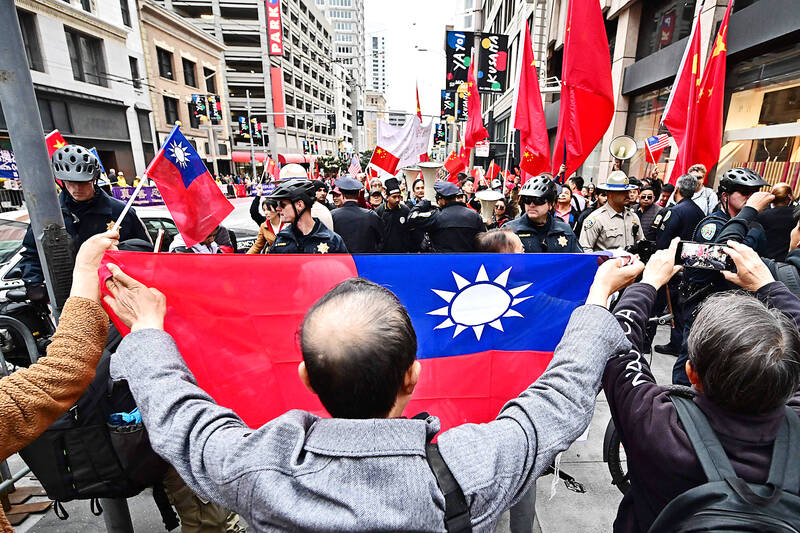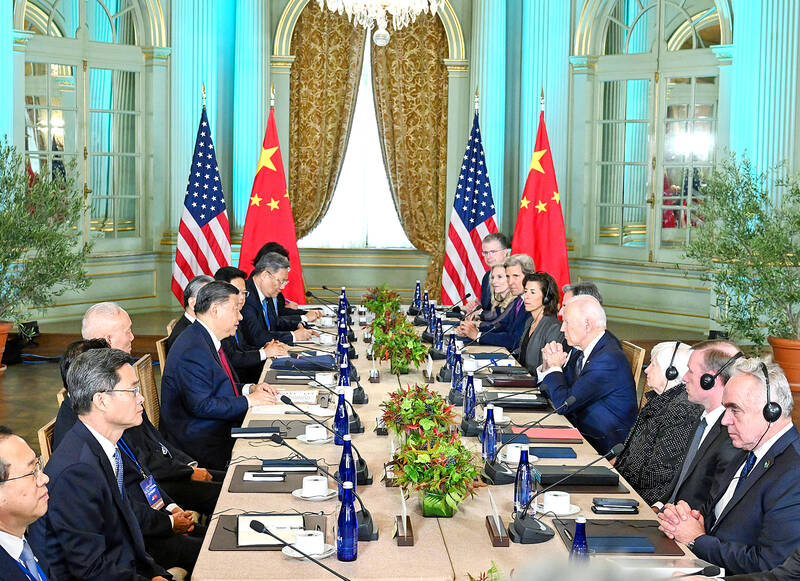US President Joe Biden said he “stressed the importance of peace and stability in the Taiwan Strait,” as he met with Chinese President Xi Jinping (習近平) for about four hours on Wednesday.
Biden also asked Xi to respect Taiwan’s electoral process, a senior US official told reporters.
Biden and Xi held a “clear-headed” and “not heated” discussion on Taiwan — the most sensitive topic in the relationship with the greatest potential to spiral into wider conflict. Biden said he reaffirmed the US’ “one China” policy and its belief that any resolution must be peaceful.

Photo: AFP
“I’m not going to change that,” Biden said. “That’s not going to change.”
He reiterated, though, that the US would continue to arm Taiwan as a deterrent against any attempt by China to use force to invade the nation.
Xi told Biden he had no plans to invade the nation, although Biden chided him for China’s massive military build-up around Taiwan, the US official said.

Photo: EPA
Xi told Biden during their meeting that Taiwan was the biggest, most dangerous issue in US-China ties, the official said.
The official quoted Xi as saying that China’s preference was for peaceful “reunification” with Taiwan, but that he went on to talk about conditions in which force could be used.
Xi was trying to indicate that China is not preparing for a massive invasion of Taiwan, but that does not change the US’ approach, the official said.
“President Xi ... underscored that this was the biggest, most potentially dangerous issue in US-China relations, laid out clearly that, you know, their preference was for peaceful ‘reunification,’ but then moved immediately to conditions that the potential use of force could be utilized,” the senior US official told reporters.
Biden responded by assuring Xi that Washington was determined to maintain peace in the region.
“President Biden responded very clearly that the long-standing position of the United States was ... determination to maintain peace and stability,” the official said.
“President Xi responded: Look, peace is ... all well and good, but at some point we need to move towards resolution more generally,” the official said.
Biden and Xi met for the first time in a year for talks aimed at easing friction between the two superpowers over military conflicts, drug trafficking and artificial intelligence (AI), and they said they had made “real progress.”
Biden said talks with Xi had yielded progress in repairing strained ties in the bilateral relationship, hailing agreements to restore high-level military communications, combat fentanyl and open a dialogue over AI.
“I believe they were some of the most constructive and productive discussions we’ve had,” Biden said at a press conference following the summit. “We’ve made some important progress, I believe.”
China described the talks as a “candid and in-depth exchange of views” and said “one country’s success is an opportunity for the other,” a statement released by Chinese Ministry of Foreign Affairs read.
The ministry added that it was “unrealistic for one side to remodel the other.”
Biden highlighted the restoration of direct military-to-military contacts, saying they would prevent miscalculations between the two countries and also indicted he had the ability to speak to Xi directly.
“That’s how accidents happen, misunderstandings, so we’re back to direct, open, clear, direct communications,” Biden said.
“We’re going to continue to preserve and pursue high-level diplomacy,” he added. “To keep the lines of communication open, including between President Xi and me. He and I agreed that each one has to pick up the phone call directly and be heard immediately.”
Asked if he trusted Xi, Biden responded: “Trust, but verify as the old saying goes, that’s where I am.”
He said the US intended to “compete vigorously” with China, but added “we’ll manage that competition responsibly, so it doesn’t veer into conflict or accidental conflict.”
As he ended the press conference, though, Biden referred to Xi as a “dictator,” repeating remarks that sparked criticism from China earlier this year.
“Look, he is. He’s a dictator in the sense that he’s a guy who runs a country that is a communist country that’s based on a form of government totally different than ours,” Biden said.
Additional reporting by AP

INVESTIGATION: The case is the latest instance of a DPP figure being implicated in an espionage network accused of allegedly leaking information to Chinese intelligence Democratic Progressive Party (DPP) member Ho Jen-chieh (何仁傑) was detained and held incommunicado yesterday on suspicion of spying for China during his tenure as assistant to then-minister of foreign affairs Joseph Wu (吳釗燮). The Taipei District Prosecutors’ Office said Ho was implicated during its investigation into alleged spying activities by former Presidential Office consultant Wu Shang-yu (吳尚雨). Prosecutors said there is reason to believe Ho breached the National Security Act (國家安全法) by leaking classified Ministry of Foreign Affairs information to Chinese intelligence. Following interrogation, prosecutors petitioned the Taipei District Court to detain Ho, citing concerns over potential collusion or tampering of evidence. The

‘FORM OF PROTEST’: The German Institute Taipei said it was ‘shocked’ to see Nazi symbolism used in connection with political aims as it condemned the incident Sung Chien-liang (宋建樑), who led efforts to recall Democratic Progressive Party (DPP) Legislator Lee Kun-cheng (李坤城), was released on bail of NT$80,000 yesterday amid an outcry over a Nazi armband he wore to questioning the night before. Sung arrived at the New Taipei City District Prosecutors’ Office for questioning in a recall petition forgery case on Tuesday night wearing a red armband bearing a swastika, carrying a copy of Adolf Hitler’s Mein Kampf and giving a Nazi salute. Sung left the building at 1:15am without the armband and apparently covering the book with a coat. This is a serious international scandal and Chinese

Seventy percent of middle and elementary schools now conduct English classes entirely in English, the Ministry of Education said, as it encourages schools nationwide to adopt this practice Minister of Education (MOE) Cheng Ying-yao (鄭英耀) is scheduled to present a report on the government’s bilingual education policy to the Legislative Yuan’s Education and Culture Committee today. The report would outline strategies aimed at expanding access to education, reducing regional disparities and improving talent cultivation. Implementation of bilingual education policies has varied across local governments, occasionally drawing public criticism. For example, some schools have required teachers of non-English subjects to pass English proficiency

PERSONAL DATA: The implicated KMT members allegedly compiled their petitions by copying names from party lists without the consent of the people concerned Judicial authorities searched six locations yesterday and questioned six people, including one elderly Chinese Nationalist Party (KMT) member and five KMT Youth League associates, about alleged signature forgery and fraud relating to their recall efforts against two Democratic Progressive Party (DPP) legislators. After launching a probe into alleged signature forgery and related fraud in the KMT’s recall effort, prosecutors received a number of complaints, including about one petition that had 1,748 signatures of voters whose family members said they had already passed away, and also voters who said they did not approve the use of their name, Taipei Deputy Chief Prosecutor